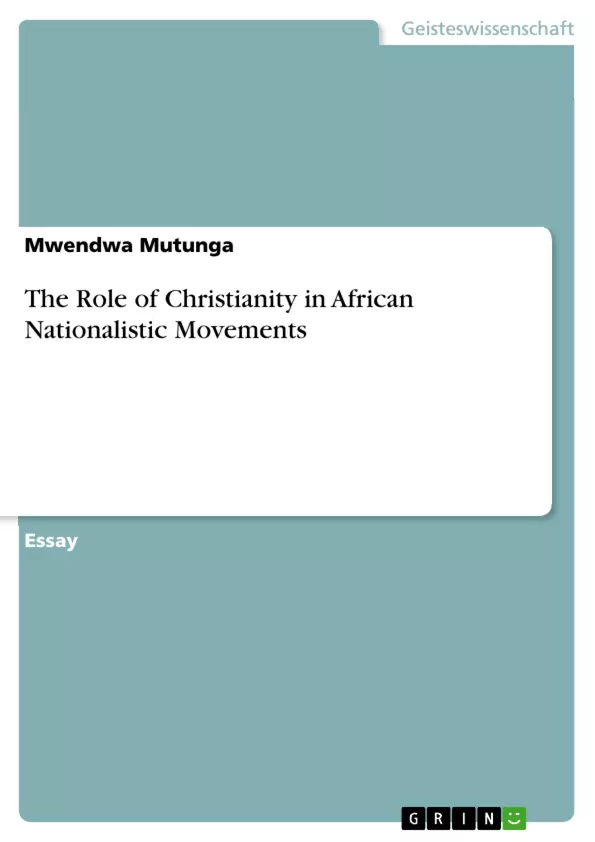The catalytic role of the Christianity in developing African nationalism arose from the education that the church schools provided in colonial Africa. In many African colonies, mission schools were the main educational institutions, and the expense of educating Africans was often borne entirely by the missions. In other colonies, the colonial government provided the funding, but the teaching staff and the curriculum were the responsibility of the missions.
Mission education had three modest goals: First, to provide the basic literacy that would enable Africans to absorb religious education and training and help in the spread of the Gospel; second, to impart the values of Western society, without which missionaries believed the Africans could not progress; and third, to raise the level of productivity of the African workers (both semiskilled and clerical) without necessarily empowering them sufficiently to challenge colonial rule. Mission education was, generally speaking, inadequate, especially in its emphasis on a religious education that Western society was already finding anachronistic. But, limited or flawed as it might have been, it was enough to whet the appetite of African people for more education and to pique their political consciousness.
Inhaltsverzeichnis
- Einführung
- Die Rolle des Christentums in der Entwicklung des Afrikanischen Nationalismus
- Missionsschulen und Bildung
- Afrikanische Schulen und das Streben nach Selbstbestimmung
- Der Aufstieg von Jomo Kenyatta und Léopold Sédar Senghor
- Die Auswirkungen der Missionsschule
- Bildung und die Entstehung Afrikanischer Führungspersönlichkeiten
- Die Doktrin des Christentums und die Gleichheit
- Die Widersprüche zwischen christlicher Lehre und missionarischer Praxis
- Die Kritik an der Missionsschule und der Förderung säkularer Schulen
- Missionare als Verfechter der Kolonialherrschaft
Zielsetzung und Themenschwerpunkte
Dieser Text untersucht die vielschichtigen Beziehungen zwischen dem Christentum und der Entwicklung des Afrikanischen Nationalismus. Er analysiert die Rolle der Missionsschulen in der Kolonialzeit und ihre Auswirkungen auf die Bildung und die politische Bewusstseinsbildung Afrikaner. Der Text befasst sich mit dem Aufstieg von Schlüsselfiguren wie Jomo Kenyatta und Léopold Sédar Senghor, deren Bildung und politische Karriere maßgeblich vom Christentum beeinflusst wurden. Weiterhin werden die Widersprüche zwischen der christlichen Lehre und der Praxis von Missionaren im Hinblick auf den Umgang mit der afrikanischen Kultur und den kolonialen Strukturen aufgezeigt.
- Die Rolle von Missionsschulen in der Entwicklung des Afrikanischen Nationalismus
- Der Einfluss des Christentums auf die Bildung und die politische Bewusstseinsbildung Afrikaner
- Die Widersprüche zwischen christlicher Lehre und missionarischer Praxis
- Die Bedeutung der afrikanischen Kultur und deren Einfluss auf die nationale Identität
- Die Kritik an der Kolonialherrschaft und die Forderung nach Selbstbestimmung
Zusammenfassung der Kapitel
Einführung
Die Einführung stellt die zentrale These des Textes vor: Das Christentum spielte eine wichtige Rolle bei der Entstehung des Afrikanischen Nationalismus, insbesondere durch die Missionsschulen und die damit verbundene Bildung. Der Text beleuchtet die komplexen Beziehungen zwischen Religion, Bildung und Politik im Kontext der afrikanischen Geschichte.
Die Rolle des Christentums in der Entwicklung des Afrikanischen Nationalismus
Dieses Kapitel analysiert die Rolle der Missionsschulen in der Kolonialzeit. Es wird gezeigt, wie die Missionsschulen zur Verbreitung von Bildung und westlichen Werten beitrugen, gleichzeitig aber auch die afrikanische Kultur und Tradition unterdrückten. Die Geschichte von Jomo Kenyatta und Léopold Sédar Senghor dient als Beispiel dafür, wie die Missionsschule zum Aufstieg von wichtigen Persönlichkeiten in der afrikanischen Politik beitrug.
Die Auswirkungen der Missionsschule
Dieses Kapitel befasst sich mit den widersprüchlichen Auswirkungen der Missionsschule. Einerseits ermöglichte sie den Afrikanern den Zugang zu Bildung und die Entwicklung politischer Fähigkeiten. Andererseits wurde die afrikanische Kultur durch die Missionare oft abgewertet und unterdrückt. Der Text diskutiert die Kritik an der Missionsschule und die Förderung säkularer Schulen, die sich mehr an der afrikanischen Kultur orientierten.
Schlüsselwörter
Afrikanischer Nationalismus, Christentum, Missionsschule, Kolonialismus, Bildung, Politik, Kultur, Identität, Jomo Kenyatta, Léopold Sédar Senghor.
Häufig gestellte Fragen
Welche Rolle spielte das Christentum für den afrikanischen Nationalismus?
Das Christentum wirkte als Katalysator, vor allem durch die Bildung in Missionsschulen, die Afrikanern das Werkzeug gaben, koloniale Strukturen intellektuell und politisch infrage zu stellen.
Was waren die Ziele der Missionsbildung?
Die Missionen wollten Alphabetisierung für das Bibellesen ermöglichen, westliche Werte vermitteln und die Produktivität der Arbeiter steigern, ohne die Kolonialherrschaft direkt zu gefährden.
Welche afrikanischen Führer wurden durch christliche Schulen geprägt?
Persönlichkeiten wie Jomo Kenyatta (Kenia) und Léopold Sédar Senghor (Senegal) erhielten ihre Ausbildung in Missionsschulen, was ihren Weg in die nationale Politik ebnete.
Welche Widersprüche gab es zwischen christlicher Lehre und kolonialer Praxis?
Während das Christentum die Gleichheit aller Menschen vor Gott lehrte, unterstützten viele Missionare faktisch die hierarchischen und unterdrückerischen Strukturen der Kolonialmächte.
Führte die religiöse Erziehung zur politischen Bewusstseinsbildung?
Ja, die Vermittlung von Konzepten wie Gerechtigkeit und Würde weckte bei vielen Afrikanern den Wunsch nach Selbstbestimmung und Unabhängigkeit von europäischer Herrschaft.
- Quote paper
- Mwendwa Mutunga (Author), 2022, The Role of Christianity in African Nationalistic Movements, Munich, GRIN Verlag, https://www.grin.com/document/1190300



